中考一般现在时,一般过去时,现在进行时复习 - 复制
中考一般现在时-一般过去时-现在进行时复习---复制

常用时 间
常与一般过去时态连用的时间有:
一般现在时:Present Simple
表示经常或者反复发生的动作 信息词:
often(经常) always(总是) every day(每天) every month(每月) every year(每年) twice a year(一年两次) sometimes(有时) usually(通常) every week(每周) every term(每学期) once a week (一周一次)
看小说 听音乐 看电影 去音乐会 去看足球赛 玩游戏 弹钢琴 上网 说英语 去公园
read novels listen to the music go to the cinema go to the concert go to watch the football match play games play the piano go online speak English go to the park
Do you know?
第一人称和第二人称的一般现在时,其谓语动词没有形式的变化, 其否定形式一般是在谓语动词前 don’t,一般疑问句在句前加do 但当主语是第三人称单数时,谓语动词形式有变化,一般在动词 末尾加s,否定句在行为动词前加doesn’t, 一般疑问句在句前加
does 动词三单的变化: 1、一般动词后加s,如:reads,plays,works,makes 2、以 s,x,ch,sh, 结尾,后加es. 如:watches, 3、以辅音字母加o结尾,一般加es ,如:does,goes 4、辅音字母+y结尾的单词,去y,加ies,如:worries studies
初中一般现在时-一般过去时-一般将来时-现在进行时总结练习
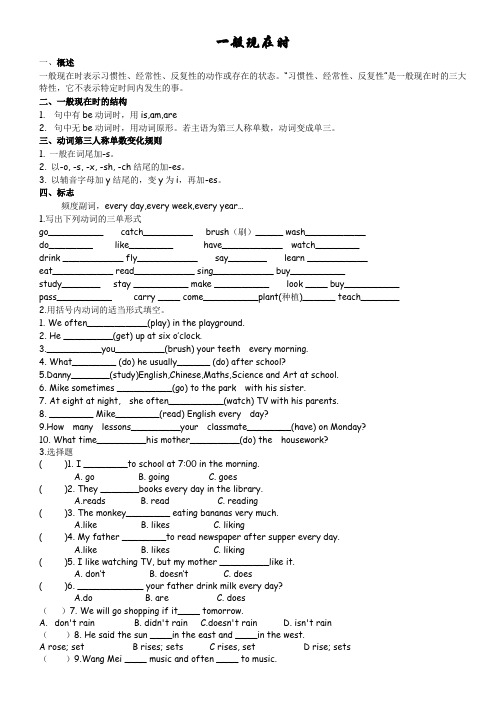
一般现在时一、概述一般现在时表示习惯性、经常性、反复性的动作或存在的状态。
―习惯性、经常性、反复性‖是一般现在时的三大特性,它不表示特定时间内发生的事。
二、一般现在时的结构1.句中有be动词时,用is,am,are2.句中无be动词时,用动词原形。
若主语为第三人称单数,动词变成单三。
三、动词第三人称单数变化规则1. 一般在词尾加-s。
2. 以-o, -s, -x, -sh, -ch结尾的加-es。
3. 以辅音字母加y结尾的,变y为i,再加-es。
四、标志频度副词,every day,every week,every year…1.写出下列动词的三单形式go__________ catch_________ brush(刷)_____ wash___________do________ like________ have___________ watch________drink ___________ fly___________ say_______ learn ___________eat___________ read___________ sing___________ buy__________study_______ stay __________ make __________ look ____ buy__________pass__________ carry ____ come__________plant(种植)______ teach_______2.用括号内动词的适当形式填空。
1. We often___________(play) in the playground.2. He _________(get) up at six o’clock.3.__________you_________(brush) your teeth every morning.4. What________ (do) he usually______ (do) after school?5.Danny_______(study)English,Chinese,Maths,Science and Art at school.6. Mike sometimes __________(go) to the park with his sister.7. At eight at night, she often__________(watch) TV with his parents.8. ________ Mike________(read) English every day?9.How many lessons_________your classmate________(have) on Monday?10. What time_________his mother_________(do) the housework?3.选择题( )1. I ________to school at 7:00 in the morning.A. goB. goingC. goes( )2. They _______books every day in the library.A.readsB. readC. reading( )3. The monkey________ eating bananas very much.A.likeB. likesC. liking( )4. My father ________to read newspaper after supper every day.A.likeB. likesC. liking( )5. I like watching TV, but my mother _________like it.A. don’tB. doesn’tC. does( )6. ____________ your father drink milk every day?A.doB. areC. does()7. We will go shopping if it____ tomorrow.A.don't rainB. didn't rainC.doesn't rainD. isn't rain()8. He said the sun ____in the east and ____in the west.A rose; setB rises; setsC rises, setD rise; sets()9.Wang Mei ____ music and often ____ to music.A like; listenB likes; listensC like; are listeningD liking ; listen()10. Jenny____ English every evening.A has studyB studiesC studyD studied4.改错(划出错误的地方,将正确的写在横线上)1. Is your brother speak English? __________________2. Does he likes going fishing? __________________3. He likes play games after class. __________________4. Mr. Wu teachs us English. __________________5. She don't do her homework on Sundays. _________________5.把下列句子变成一般疑问句(并作肯定和否定回答)、否定句1.My friends like playing soccer.2.They speak English every day.3.Daniel watches TV every evening4.John is from Canada.5.Tom does his homework at home.6.My dog runs fast.7.Amy likes playing computer games.8.She can play the piano well.现在进行时态1.定义:现在进行时表示正在发生或进行的动作。
英语总复习专题:八种时态总复习

例如:He said that he would finish his work before 9 o’clock.
他说他会在九点之前完成工作。
2)“was/were going to+动词原形”所表示的过去将来
时,表示过去曾经打算做某事。
在疑问句中,主语为第一人称时(I和we)时,常 用助动词shall。 例如: Shall we go to the zoo tomorrow? 我们明天去动物园,好吗?
结构二: 主语+be going to +动词原形+其它 I am going to buy a car next year.
2. 一般将来时的用法 : 结构一的用法: 1)表示将来某个时间要发生的动作或存在的状态, 例如:I'll meet you at the school gate tomorrow morning. 2)表示将来经常或反复发生的动作。 例如:I’ll come and see you every Saturday next year. 3)表示说话人对于将来的看法、假设和推测。 例如:I think she’ll go back home for supper.
例如: He often goes swimming in summer.
他夏天经常游泳。
I usually leave home for school at 7 every morning.每天早上我七点离开家去学校。
2)表示现在的状态。 例如: The boy is twelve. 这男孩十二岁。 3)表示主语具备的性格、特征和能力等。 例如: My sister is always ready to help others . 我妹妹总是乐于助人。 Ann writes good English but does not speak well. 安英语写得不错,讲的可不行。
中考总复习之英语常见时态(整理版)

finish/end come go out
3.常见句型 3.常见句型 主句(现在完成时)+since 从句(一般过去时). 主句(现在完成时)+since 从句(一般过去时). It is +一段时间+ since 从句(一般过去时). +一段时间 一段时间+ 从句(一般过去时).
It is three days since they borrowed that book. They have kept that book for three days句子: 译下列句子: 短暂性动词不能跟表示一段时间的状语 3、这本书他买了一年了 连用, 连用 必须转变成持续性动词 He has bought this book for a year .× He has had this book for a year .
4、 这本书他借了三天了。 、 这本书他借了三天了。
Exercise
(2008衢州中考 衢州中考) 衢州中考 --- Why didn’t you come and open the door for me, dear? --- Sorry, Jack. I ______ in the kitchen and didn’t hear you. A.was cooking C. wave cooked B. am cooking D. will cook
一般现在时的注意点: 一般现在时的注意点:
1 、表客观事实或普遍真理 goes The earth _____ (go) round the sun . 2 、 在when ,as soon as, until, after, before等到引导的时间状语从句和 引导 等到引导的时间状语从句和if 等到引导的时间状语从句和 的条件状语从句中, 一般现在时表示将来 表示将来. 的条件状语从句中 用一般现在时表示将来
中考英语时态复习学案一般现在时、现在进行时、一般过去时
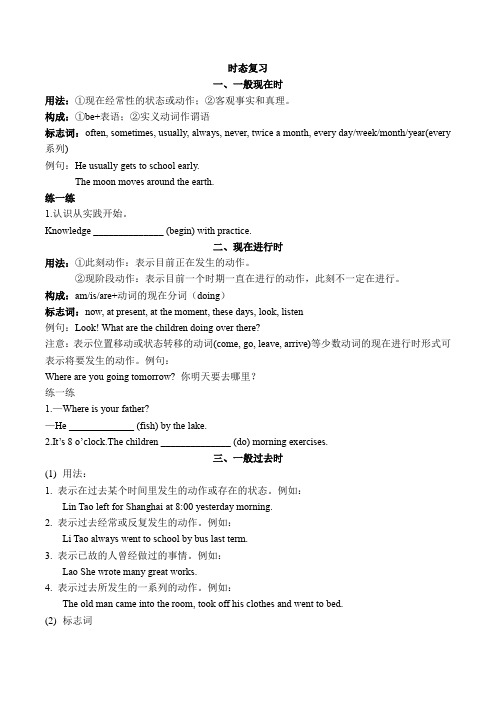
时态复习一、一般现在时用法:①现在经常性的状态或动作;②客观事实和真理。
构成:①be+表语;②实义动词作谓语标志词:often, sometimes, usually, always, never, twice a month, every day/week/month/year(every 系列)例句:He usually gets to school early.The moon moves around the earth.练一练1.认识从实践开始。
Knowledge ______________ (begin) with practice.二、现在进行时用法:①此刻动作:表示目前正在发生的动作。
②现阶段动作:表示目前一个时期一直在进行的动作,此刻不一定在进行。
构成:am/is/are+动词的现在分词(doing)标志词:now, at present, at the moment, these days, look, listen例句:Look! What are the children doing over there?注意:表示位置移动或状态转移的动词(come, go, leave, arrive)等少数动词的现在进行时形式可表示将要发生的动作。
例句:Where are you going tomorrow? 你明天要去哪里?练一练1.—Where is your father?—He _____________ (fish) by the lake.2.It’s 8 o’clock.The children ______________ (do) morning exercises.三、一般过去时(1)用法:1. 表示在过去某个时间里发生的动作或存在的状态。
例如:Lin Tao left for Shanghai at 8:00 yesterday morning.2. 表示过去经常或反复发生的动作。
2024年中考复习时态专项(课件)

五、【过去进行时】
试卷讲评课件
1.结构:主语+be(was/were)+doing(动词的现在分词形式) 2.定义: (1)过去某一时刻或阶段正在进行的动作 They were swimming at 3:00pm yesterday. (2)表示一个动作发生时另一个动作正在进行,常与when.while等引导时 间状语的词连用 I was doing my homework while my mom is cooking. 3.时间状语:at the time of… 在…的时候 at this/that time 在这时/在那 时/ at +点钟+过去的时间.when.while等引导过去时间状语的从句
一Oh! It ________ (leave )some sweet memories in my heart in the past several months. 17.—Is Helen here?一No, she isn't here. She ________ (arrive) in half an hour.
动词的时态的复习
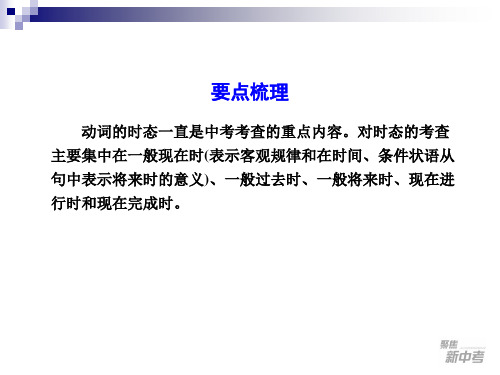
(4)come, go, move, leave, stay等动词的现在进行时可以表示 按计划将要发生的事。如:
I’m leaving tomorrow. 明天我要走了。 They are going camping for vacation. 他们度假要去野营。 Are you staying here till next week? 你会在这儿呆到下周吗?
要点梳理
动词的时态一直是中考考查的重点内容。对时态的考查 主要集中在一般现在时(表示客观规律和在时间、条件状语从 句中表示将来时的意义)、一般过去时、一般将来时、现在进 行时和现在完成时。
Ⅰ.一般现在时: 一般现在时用动词原形来表示。当主语为第三人称单数时, 动词要变为第三人称单数形式。 1.表示经常性或习惯性的动作、存在的状态或现阶段的习惯 行为。 常用的时间状语:every day, usually, always, often, sometimes, on Sunday, once a week等。 如:I go to school at 7 every morning. 每天早上我七点去上学。 2. 表示目前的情况,特点或状态。 如:I am a teacher. 我是教师。 She likes watching TV. 她喜欢看电视。
come/arrive/reach/ get/move to—be in/at come back—be back
buy—have borrow—keep go out—be out die—be dead leave—be away return—be back go to bed—be in bed become—be go to sleep—sleep
Ⅲ.现在进行时: 现在进行时表示现阶段或说话时正在进行的动作及行为,常 和now, at this time, these days等时间状语连用。句子基本结构为: be动词am/is/are+现在分词。 如:Look, they are running. 看,他们正在跑步。
中考一般现在时,一般过去时,现在进行时复习

肯定句:V+s/es动词三单数 否定句:doesn’t +V(原) 一般疑问句:does提前 +V(原)
动词单三形式规则o 等结尾的词 以辅音字母 +y结尾的词 变 y 为 i再 构成方法 加- s 读音 清辅音后读 [s] 浊辅音和元 音后读[z] 读[iz] 或[z] 读[z] 例词 likes gets finds goes, teaches, watches
6.We_______ have)much work don’t ________(not have to do today. Do you want ____ to be(be) a policeman? 7.____
Do exercises:
用do, don’t, does, doesn’t填空。 Do 1. ________you have a soccer ball? Yes, I ____________. do Does 2. ___________ Dave have a tennis racket? doesn’t No, he ____________. Does 3. ___________your sister have a volleyball? does Yes, she ____________. Do 4. ___________ they have a TV? do Yes, they ____________. do 5. __________ we have a computer? Yes,they_____. Do
加-es
加-es
study→ studies
1.He often _____(help) helps me.
speak (speak) English or 2._____ Does Mr. Green _____ Japanese?
英语中考归纳复习专题:动词的时态
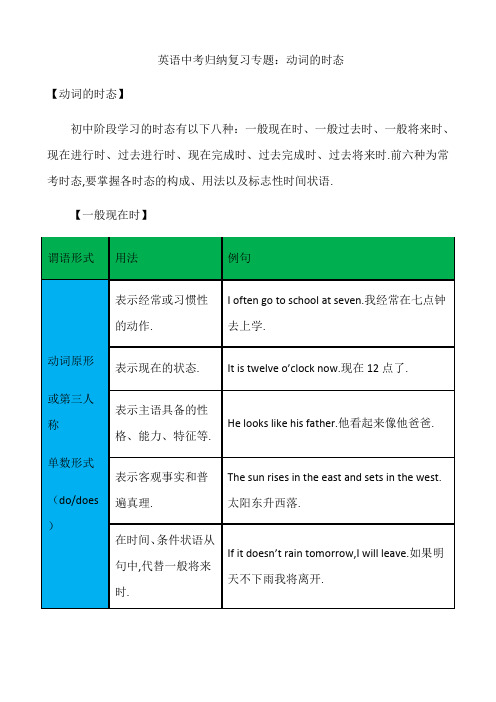
英语中考归纳复习专题:动词的时态【动词的时态】初中阶段学习的时态有以下八种:一般现在时、一般过去时、一般将来时、现在进行时、过去进行时、现在完成时、过去完成时、过去将来时.前六种为常考时态,要掌握各时态的构成、用法以及标志性时间状语.【一般现在时】【考点训练1】1.My father is a teacher and he _________ (teach) in a middle school.2.Yesterday the teacher told us the earth _______ (go) around the sun.3.—When shall we begin our meeting?—We’ll begin it when Helen ___ . ()esB.cameC.will comee4.—How do you usually go to school?—I usually ___ to school on foot. ()A.goB.wentC.was goingD.will go答案:teaches goes A A【一般过去时】要点提醒:“used to+动词原形”表示过去的习惯或状态.如:Mum used to tell us stories.妈妈过去常给我们讲故事.【考点训练2】1.Mike ________ (not go) to bed until 12 o’clock last night.2.He asked if I _____ (be) a student.3.Will you please say it again?I ___ quite ___ you.()A.don’t;hearB.didn’t;hearC.don’t;heardD.didn’t;heard4.He _____ go out with his parents,but now he ____ staying at home alone. ()ed to;is used toB.is used to;used toe to;is used toed to;used to答案:didn’t go was B A【一般将来时】要点提醒:be going to与will的区别1.be going to 指已计划好的事或思考过的意图、打算,will表示未事先思考或未计划而临时做出的决定.如:I’m going to see him tomorrow.我打算明天去看他.(事先经过思考)I’ll answer the door.我去开门.(未经事先考虑)2.be going to可表示客观迹象表明马上要发生的事,而will则表明说话者的主观意愿.如:Look at the clouds.There is going to be a storm.看看这些云,暴风雨就要来了.(客观迹象表明要发生)I hope it will be warm tomorrow.我希望明天会暖和起来.(主观意愿)3.在含有条件状语从句的复合句的主句中,一般用will,不用be going to. 如:I will come if it doesn’t rain.如果不下雨的话,我就来.【考点训练3】1.____ a concert in our school next Saturday. ()A.There isB.There areC.There will beD.There will have2.If they can arrive by 9:00 am,we ___ a meeting.()A.haveB.will haveC.hadD.would have3.He ___ her a beautiful hat on her next birthday.()A.givesB.gaveC.will givingD.is going to give答案:C B D 【现在进行时】【考点训练4】1.They ____________ (have) a math test in the classroom now.2.Look! He ___________ (lie) on the beach.3.—Pass the raincoat to me.It ___ hard now.—Here you are. ()A.rainB.is rainingC.rainedD.will rain4.—Cathy,can you answer the door?I ___ the room.—I’m coming,Mum. ()A.CleanB.cleanedC.have cleanedD.am cleaning答案:are having is lying B D【过去进行时】He was forever com plaining about something.他老是怨这怨那.要点提醒:1.在含有时间状语从句的复合句中,延续时间较长的动作常用过去进行时,另一个短暂性动作用一般过去时.如:When the UFO landed,I was shopping at the clothes store.当UFO落地时,我正在服装店买衣服.2.表示两个延续性动作在过去某一时刻同时进行,不考虑动作的先后顺序,主句和从句的谓语动词都用过去进行时,连词常用while.如:Tom was doing his homework while I was reading a newspaper.我在看报纸时,汤姆在做作业.【考点训练5】1.Mike and I ___________ (play) basketball at that time yesterday afternoon.2.While Mr.Johnson _______________ (work) in the office,the phone rang.3.The girl ___ for the bus when the rainstorm came.()A.waitedB.have waitedC.is waitingD.was waiting4.—Jenny,I called you at nine last night,but you didn’t pick up.—Oh,I ____ a popular program called Go Fighting!.()A.watchB.watchedC.was watchingD.am watching答案:were playing was working D C【现在完成时】要点提醒:1.have/has been to,have/has gone to与have/has been in(考点讲解详见P74考点1)2.延续性动词与非延续性动词英语中的动词按动作发生的方式、发生过程的长短可分为延续性动词和非延续性动词两种,非延续性动词也可称为短暂性动词或瞬间动词.在现在完成时态中,有时要将非延续性动词转换为延续性动词,这样才能和时间段连用.转换方法如下:(1)将短暂性动词转换为“be+形容词或副词”.请看下表:如:这间商店开门6小时了.The shop has opened for 6 hours.( ×)The shop has been open for 6 hours.( √)(2)有的短暂性动词可以转换为意思相同的延续性动词.请看下表:如:这本书我借了一个月了.I have borrowed the book for one month.( ×)I have kept the book for one month.( √)3.现在完成时与一般过去时的区别现在完成时强调某一动作或状态对现在造成的影响或结果,不能和表示过去的时间状语连用;一般过去时只表示过去的事实,不表示和现在的关系,可以和表示过去的时间状语连用.如I bought a ticket yesterday.我昨天买了一张票.(强调我昨天做的一件事是买票)I have already bought a ticket.我已经买了一张票.(强调我已经有票了,无须再惦记票的事了)4.现在完成时的其他句型【考点训练6】1.—you _____ your homework yet?—Yes.I ______ it a moment ago. ()A.Did;do;finishedB.Have;done;finishedC.Have;done;have finishedD.Will;do;finish2.His father ___ the Party since 1978. ()A.joinedB.has joinedC.was inD.has been in3.Miss Green isn’t in the office.She to the library. ()A.has goneB.wentC.will goD.has been 答案:B D A【过去完成时】had + 过去分词表示在过去的过去发生的动作或存在的状态.I had had three pieces of cake when you arrived.你来的时候我已经吃了三块蛋糕了.表示过去某一动作或状态持续到过去另一时间.The old man had lived in Shanghai for ten years beforeTom came here.汤姆来这儿之前,这个老人已经住在上海十年了.时间标志by the time...,before,when等构成的短语或引导的从句【考点训练7】1.在我们到达电影院之前,电影已经开始了.The film __________ before we _______ to the cinema.2.警察赶到时,小偷已经逃跑了.When the police __________,the thief____________________ .答案:had begun got arrived had run away 【过去将来时】【考点训练8】1.李明说如果布莱恩下个月来中国,他将会很高兴.Li Ming said he ___________ happy if Brian came to China the next month.2.蒂娜说她下周三打算来参加我的生日派对.Tina said she ________________ my birthday party the next Wednesday.答案:would be was going to【中考示例】(2017·广西)If he _____ Guilin,he’ll probably go to Yangshuo. ( )A.visitsB.is visitingC.will visitD.has visited【解析】考查动词的时态.句意:如果他游览桂林,他有可能会去阳朔.if引导条件状语从句时,时态遵循“主将从现”原则,从句中用一般现在时表示将来.【考题热身】1.(2017·甘肃)I promise I ________ (send) you an email to explain all of these tomorrow.2.(2017·甘肃)Be quiet! The patients ______________(sleep).3.(2017·鄂州)Sandy’s grandparents__________________ (marry) for 50 years.4.(2017·台州改编)A true friend always ____________(support) you whenever youare in trouble.5.(2017·宿迁)I ______________(wash) the dishes while my sister was sweeping the floor.6.(2017·云南)—What do you think of your hometown, Kate?—It a lot.It’s more beautiful than before. ()A.has changedB.changesC.will changeD.change7.(2017·武汉)—Linda is not coming for the party tonight.—But she ______!()A.promisesB.promisedC.will promiseD.had promised8.(2017·毕节)It’s nice to see you again.We ___ each other since 2016. ()A.won’t seeB.haven’t seenC.don’t seeD.didn’t see9.(2017·黔东南)If it doesn’t rain this weekend,we ___ a picnic in the Jinquan Park. ()A.haveB.will haveC.have hadD.had10.(2017·上海)Some exchange students ___ with their host families this time yesterday. ()A.are chattingB.will chatC.were chattingD.have chatted11.(2017·重庆B卷)—Where is your uncle?I haven’t seen him for a long time. —He _____ Beijing for about half a year.He moved there in January. ()A.has gone to B.has been toC.has arrived inD.has been in12.(2017·重庆B卷)John and I ___ to visit his grandparents last Sunday afternoon. ()A.goB.wentC.will goD.have gone13.(2017·重庆A卷)In the past few years,many schools ____ the ways of doing morning exercises. ()A.changeB.changesC.will changeD.have changed14.(2017·重庆A卷)As soon as the rain _____ ,they will go out to pick apples. ()A.stopsB.stoppedC.will stopD.is stopping15.(2017·河北)Don’t take the dictionary away.I ___ it. ()eedC.am usingD.have used答案:will send are sleeping have been married supports A B BBCDBDAC。
一般现在时--一般过去时---现在进行时--过去进行时归纳总结
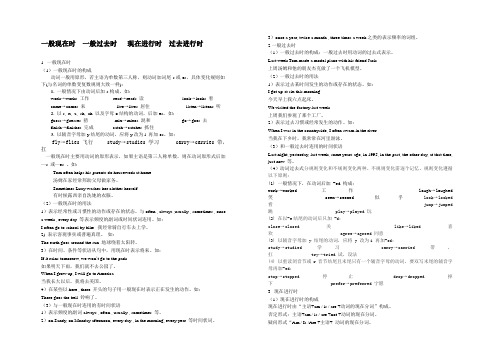
一般现在时一般过去时现在进行时过去进行时1. 一般现在时(1)一般现在时的构成动词一般用原形,若主语为单数第三人称,则动词加词尾-s或-es,具体变化规则如下(与名词的单数变复数规则大致一样):1.一般情况下由动词后加-s构成。
如:work→works 工作read→reads 读look→looks 看come→comes 来live→lives 居住listen→listens 听2.以s, x, z, sh, ch 以及字母o结构的动词,后加-es。
如:guess→guesses 猜mix→mixes 混和go→goes 去finish→finishes 完成catch→catches 抓住3.以辅音字母加y结尾的动词,应将y改为i 再加-es。
如:fly→flies 飞行study→studies 学习carry→carries 带,扛一般现在时主要用动词的原形表示,如果主语是第三人称单数,则在动词原形式后加—s 或—es 。
如:Tom often helps his parents do housework at home.汤姆在家经常邦助父母做家务。
Sometimes Lucy washes her clothes herself.有时候露西亲自洗她的衣服。
(2)一般现在时的用法1)表示经常性或习惯性的动作或存在的状态。
与often , always ,usually , sometimes , once a week , every day 等表示频度的副词或时间状词连用。
如:I often go to school by bike. 我经常骑自行车去上学。
2) 表示客观事实或普遍真理。
如:The earth goes around the sun .地球绕着太阳转。
3)在时间、条件等状语从句中,用现在时表示将来。
如:If it rains tomorrow, we won’t go to the park.如果明天下雨,我们就不去公园了。
一般现在时、现在进行时、一般将来时、一般过去时知识点总结
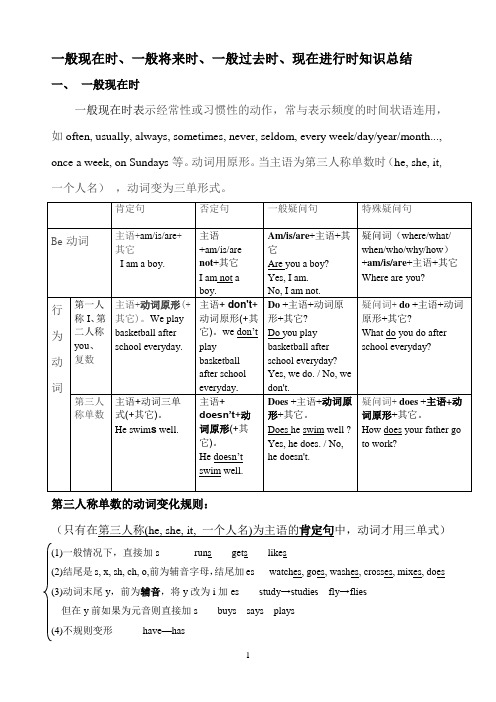
一般现在时、一般将来时、一般过去时、现在进行时知识总结一、一般现在时一般现在时表示经常性或习惯性的动作,常与表示频度的时间状语连用,如often, usually, always, sometimes, never, seldom, every week/day/year/month..., once a week, on Sundays等。
动词用原形。
当主语为第三人称单数时(he, she, it, 一个人名),动词变为三单形式。
第三人称单数的动词变化规则:(只有在第三人称(he, she, it, 一个人名)为主语的肯定句中,动词才用三单式)(1)一般情况下,直接加s runs gets likes(2)结尾是s, x, sh, ch, o,前为辅音字母,结尾加es watches, goes, washes, crosses, mixes, does(3)动词末尾y,前为辅音,将y改为i加es study→studies fly→flies但在y前如果为元音则直接加s buys says plays(4)不规则变形have—has二、一般将来时一般将来时表示将来发生的事。
常与tomorrow, next day/week/month/year..., soon, in a few minutes, the day after tomorrow, in the future等时间状语连用。
Will/shall +动词原形;(shall用语第一人称)be(am/is/are) going to+ 动词原形三、一般过去时一般过去时表示过去某一时候或某一段时间所发生了的事情或存在的状态。
常与过去时间yesterday,ago, this morning,just now,a moment ago,last night / year / week/month,once upon a time,the other day,before,the day before yesterday, in 1989, at the age of five, one day, then(那时), on that day,in the past连用。
中考英语主要时态归纳总结
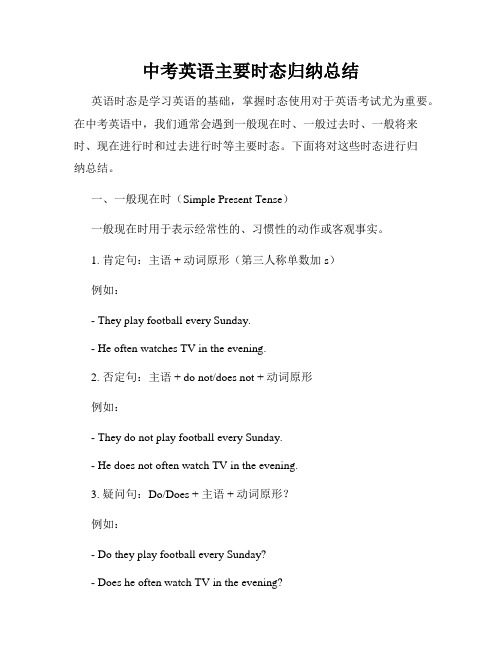
中考英语主要时态归纳总结英语时态是学习英语的基础,掌握时态使用对于英语考试尤为重要。
在中考英语中,我们通常会遇到一般现在时、一般过去时、一般将来时、现在进行时和过去进行时等主要时态。
下面将对这些时态进行归纳总结。
一、一般现在时(Simple Present Tense)一般现在时用于表示经常性的、习惯性的动作或客观事实。
1. 肯定句:主语 + 动词原形(第三人称单数加s)例如:- They play football every Sunday.- He often watches TV in the evening.2. 否定句:主语 + do not/does not + 动词原形例如:- They do not play football every Sunday.- He does not often watch TV in the evening.3. 疑问句:Do/Does + 主语 + 动词原形?例如:- Do they play football every Sunday?- Does he often watch TV in the evening?二、一般过去时(Simple Past Tense)一般过去时用于表示发生在过去某个时间的动作或状态。
1. 肯定句:主语 + 动词过去式例如:- I visited my grandparents last weekend.- She bought a new dress yesterday.2. 否定句:主语 + did not + 动词原形例如:- I did not visit my grandparents last weekend.- She did not buy a new dress yesterday.3. 疑问句:Did + 主语 + 动词原形?例如:- Did you visit your grandparents last weekend?- Did she buy a new dress yesterday?三、一般将来时(Simple Future Tense)一般将来时用于表示将来要发生的动作或存在的状态。
年中考语法复习五大时态(一般现在_过去_将来时现在_过去进行时)

7. Sally_________ speaking English with her friends every Sunday.
A.practices B. is practicing C构成
以重读闭音节结尾且末尾只有一个辅音字母的动词,双写该辅音字母后再加-ed
stop→stopped plan→planned
重点记忆课本后常见不规则变化的动词过去式
单项选择
1.—Have you ever visited the Forbidden City? —Yes. I_______ last year.
5. As long as you ______ hard, your dreams __________ true.
A.study;will come B.studies; will come C.studies; comes
6. The earth is a planet and it____________ around the sun.
3. —Wow, you’ve made so much progress in math.
—Thanks. I_______ some online classes this winter holiday.
A.took B.take C.will take D.have taken
4.In my school days, I ________ a lot of reading in English every day. That was how I learned English at that time.
表示过去的习惯或经常发生的动作(即过去某一个阶段中经常发生的事情)
英语人教版九年级全册语法复习之时态

8. 7. – What has happened to the fish, Mary?
9. -- Mum, the chaat s__e_a_te_n_ (eat) the fish. Just now
the jcuamt _p_e_d__(jump) onto the table anadte_____(eat)
动词时态
初中阶段8种时态: 1.一般现在时 2.一般过去时 3.一般将来时 4.现在进行时 5.过去进行时 6.现在完成时 7.过去完成时 8.过去将来时
(1) 一般现在时:
1.表示经常反复发生的动作.
2. e.g. They often spend their holidays in
the south.
5. -- ___Is_ my son __w_o_r_k_in_g___ (work) hard this term?
6. -- Oh, yes, he _is__tr_y_i_n_g__(try) his best now.
7. 6. D__o_e_s__ the hatfi_t______ (fit) me well?
it up. lived
10.8. Sam ____( live) in the small town fhoarvfievegryoewanrs
during the war.
saw
11.9. It is ages since I last ____(see) you. You
___(grow) taller.
进行)的动作: 4. e.g. We are writing a paper these days.
一般现在时与现在进行时的区别
1.进行时强调动作正在进行,而现在时强调动作的
初中英语八种时态归纳复习
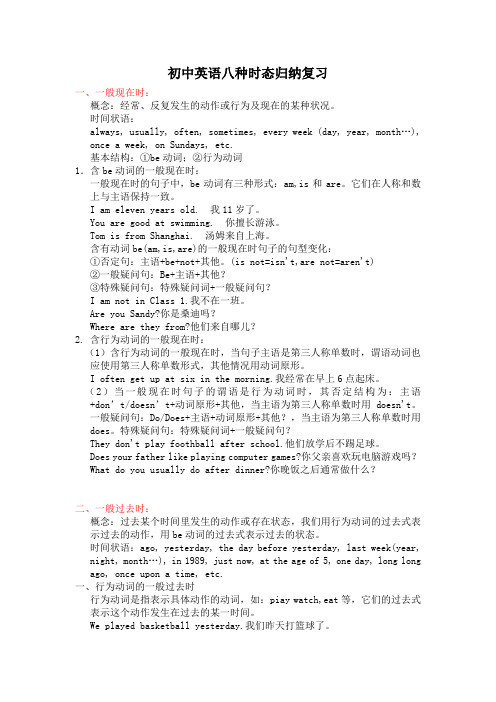
初中英语八种时态归纳复习一、一般现在时:概念:经常、反复发生的动作或行为及现在的某种状况。
时间状语:always, usually, often, sometimes, every week (day, year, month…), once a week, on Sundays, etc.基本结构:①be动词;②行为动词1.含be动词的一般现在时:一般现在时的句子中,be动词有三种形式:am,is和are。
它们在人称和数上与主语保持一致。
I am eleven years old. 我11岁了。
You are good at swimming. 你擅长游泳。
Tom is from Shanghai. 汤姆来自上海。
含有动词be(am,is,are)的一般现在时句子的句型变化:①否定句:主语+be+not+其他。
(is not=isn't,are not=aren't)②一般疑问句:Be+主语+其他?③特殊疑问句:特殊疑问词+一般疑问句?I am not in Class 1.我不在一班。
Are you Sandy?你是桑迪吗?Where are they from?他们来自哪儿?2. 含行为动词的一般现在时:(1)含行为动词的一般现在时,当句子主语是第三人称单数时,谓语动词也应使用第三人称单数形式,其他情况用动词原形。
I often get up at six in the morning.我经常在早上6点起床。
(2)当一般现在时句子的谓语是行为动词时,其否定结构为:主语+d on’t/doesn’t+动词原形+其他,当主语为第三人称单数时用doesn't。
一般疑问句:Do/Does+主语+动词原形+其他?,当主语为第三人称单数时用does。
特殊疑问句:特殊疑问词+一般疑问句?They don't play foothball after school.他们放学后不踢足球。
中考复习资料之英语一般现在时,一般过去时,现在进行时复习共32页文档

END
中考复习资料之英语一般现在时,一般 过去时,现在进行时复习
41、俯仰终宇宙,不乐复何如。 42、夏日长抱饥,寒夜无被眠。 43、不戚戚于贫贱,不汲汲于富贵。 44、欲言无予和,挥杯劝孤影。 45、盛年不重来,一日难再晨。及时 当勉励 ,岁月 不待人 。
16、业余生活要有意义,不要越轨。——华盛顿 17、一个人即使已登上顶峰,也仍要自强不息。——罗素·贝克 18、最大的挑战和突破在于用人,而用人最大的突破在于信任人。——马云 19、自己活着,就是为了使别人过得更美好。——雷锋 20、要掌握书,莫被书掌握;要为生而读,莫为读而生。——布尔沃
- 1、下载文档前请自行甄别文档内容的完整性,平台不提供额外的编辑、内容补充、找答案等附加服务。
- 2、"仅部分预览"的文档,不可在线预览部分如存在完整性等问题,可反馈申请退款(可完整预览的文档不适用该条件!)。
- 3、如文档侵犯您的权益,请联系客服反馈,我们会尽快为您处理(人工客服工作时间:9:00-18:30)。
3 Tom watched TV for two hours.(对画线部分提问) How long did Tom watch TV?
4 She helped me do some cleaning.(对画线部分提问) What did She do you help ?
PRACTISE
改写句子: 1、Lucy did her homework at home.(改否定句) didn’t do Lucy _______ _______ her homework at home. 2、He found some meat in the fridge.(变一般疑问句) Did find any ______ he _____ ______ meat in the fridge? 3、She stayed there for a week.(对划线部分提问) How long did stay ______ ______ _____ she _____ there?
Let’s remember: Do you remember the words in your life? 你记得你生活中的一些常用词汇吗?
起床 吃早饭 上课 吃午饭 休息 做运动 吃晚餐 做家庭作业 看电视 上床睡觉 get up have breakfast start lesson have lunch have a break do sports have dinner do homework watch TV go to bed
I cleaned the room yesterday. I did some cleaning yesterday.
一般过去时:Past Simple
表示过去发生的动作或存在的状态
She was at home yesterday.
构成:系动词be的过去时
行为动词的一般过去时:
陈述句:主语+动词过去式+其它 •She did homework yesterday .
看小说 听音乐 看电影 去音乐会 去看足球赛 玩游戏 弹钢琴 上网 说英语 去公园
read novels listen to the music go to the cinema go to the concert go to watch the football match play games play the piano go online speak English go to the park
否定句:主语+助动词didn’t+动词原形+其它 •She didn’t do homework yesterday. 一般疑问句:Did +主语+动词原形+其它 •Did she do homework yesterday? Yes,she did./No,she didn’t.
常用时 间
常与一般过去时态连用的时间有:
①直接加-ing. ②重读辅元辅,双写尾字母加-ing. ③以e 结尾去e加-ing .
动词第三人称
①直接加-s.
单数的构成:
②以s, x, ch, sh, o结尾加-es. ③以“辅音+y “结尾变y 为i再加-es.
①直接加-ed. 过去式 的构成: ②以e结尾只加d. ③重读辅元辅,双写尾字母再加-ed.
yesterday yesterday morning (afternoon, evening…) last night (week, month, year…) two days ago, a week ago, ago… in 1990, (in 1998…) three years
变化规则 一般在词尾加—ed 以不发音的e结尾的,只 加--d
④以“辅音+y”结尾变y 为i 再加-ed.
表格对比学习
对比 动词形式 时态 现在进 be+v-ing 行时 (现在分词) 一般现 在时 一般过 去时 V -原形 V-三人单 V-ed (过去式) 否定句 在be 后 加上not 一般问句 Be提到 句首 在行为v.前借用 Do,Does do ,does后加not, 提到句首, 行为动词 行为动词还原 还原 在行为v.前借 用did后加not, 行为动词还原 Did 提到句 首,行为 动词还原
What do you often do on the Internet?
6.He has lunch at school.
Who has lunch at school?
Where does he have lunch?
Do you know?
第一人称和第二人称的一般现在时,其谓语动词没有形式的变化, 其否定形式一般是在谓语动词前 don’t,一般疑问句在句前加do 但当主语是第三人称单数时,谓语动词形式有变化,一般在动词 末尾加s,否定句在行为动词前加doesn’t, 一般疑问句在句前加
一般现在时:Present Simple
表示经常或者反复发生的动作 信息词:
often(经常) always(总是) every day(每天) every month(每月) every year(每年) twice a year(一年两次) sometimes(有时) usually(通常) every week(每周) every term(每学期) once a week (一周一次)
4、There was some orange in the cup.(变一般疑问句) Was any _____ there _____ orange in the cup?
现在进行时: Present Progressive
表示现在正在发生的动作
结构: be (is, am, are) + doing
肯定句:sb+be+v.ing+… 否定句:sb+be+v.ing+… 疑问句:Be+sb+v.ing? 特殊疑问词+be+sb+ving?
标志语: Look! 、 Listen! 、now
动词-ing形式的构成:
一般在动词原形后 +ing 以不发音的e结尾的, 去e,+ing 重读闭音节以一个辅音 字母结尾的,双写这一 字母+ing
go ask write take get run swim
going asking
writing taking
getting running swimming
现在进行时:
(The Present Continuous Tense)
现在正在进行的动作
时 一般现在时:经常或习惯性的动 态 (The Simple
Present Tense)
作或存在的状态。
一般过去时: 过去某个时间或时间段发 (The Simple 生的动作或存在的状态。 Past Tense)
各时态常用的信息词
现在进行时: now , Look! Listen! at this time Where is …? Don’t talk! It’s 8:00am. always , usually, often, sometimes ,seldom, never, every day, every… ,three times a day
does 动词三单的变化: 1、一般动词后加s,如:reads,plays,works,makes 2、以 s,x,ch,sh, 结尾,后加es. 如:watches, 3、以辅音字母加o结尾,一般加es ,如:does,goes 4、辅音字母+y结尾的单词,去y,加ies,如:worries studies
定义: 一般现在时:1、表达经常性或习惯性的动作。 2、表示现在的状态。 例如: 1、我们每天都上学。
We go to school every day.
2、下课后我们打扫教室。
We clean the classroom after class.
3、有时我们在操场上踢足球 。 4、我们在学校吃晚饭。
例词 play→played like →liked love →loved
以辅音字母+y 结尾的, study →studied 变y为i ,再加—ed carry →carried 以一个辅音字母结尾的 重读闭音节,先双写这 个辅音字母,再加-ed stop →stopped plan →planned
What do the elephants like eating?
4. He sends two emails every week.
How many emails does he send every week?
How often does he send two emails?
5.I often make travel plans on the Internet.
一般现在时:
last night, last…, two days ago, …ago,
一般过去时: in 1999, in +过去的年份, just now =a moment ago,
yesterday,
yesterday morning
改一般疑问句的方法: ①首先看有无be动词,如果有,将be提到句首 并大写,句末打问号. ②如果没有be动词,看原句的动词形式来决定 借用助动词do/does/did,并且行为动词要还原。 Do… V-原形 V-s/es Does… +动词原形…?
We sometimes play football on the playground. We have dinner at school.
5、他喜欢英语。
He likes English. He is a student.
